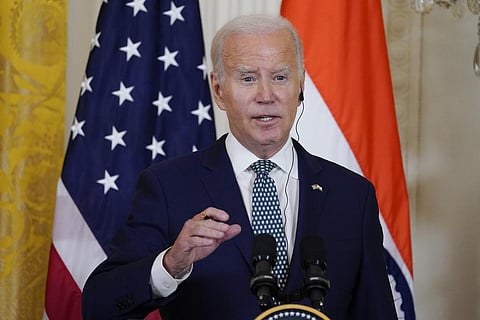

WASHINGTON: President Joe Biden on Thursday defended his harsh public comments on China, including calling President Xi Jinping a dictator, saying his words would have no negative impact on US-China relations and that he still expects to meet with Xi sometime soon.
Biden said his blunt statements regarding China are "just not something I’m going to change very much.”
The remarks, which drew a formal protest from China, opened a new rift just days after Secretary of State Antony Blinken concluded a visit to Beijing that was meant as a step toward stabilizing ties and improving communications.
But Biden was undeterred.
“I expect to be meeting with President Xi sometime in the future, near-term. And I don’t think it’s had any real consequence," he said.
His latest rebuff to China came on the same afternoon he welcomed Indian Prime Minister Narendra Modi to the White House in an alliance-strengthening move against their shared rival, China.
Just hours earlier, China's embassy in Washington said it had delivered a formal protest, with Chinese Ambassador Xie Feng telling senior White House and State Department officials Wednesday that Washington “should take earnest actions to undo the negative impact” of what Biden said or “bear all the consequences."
“With the latest irresponsible remarks about China’s political system and its top leader, people cannot help but question the sincerity of the US side” in seeking to stabilize relations, the embassy said in a statement. “The Chinese government and people do not accept any political provocation against China’s top leader and will resolutely respond.”
At a campaign fundraiser on Tuesday, Biden had called the Chinese president a dictator, depicted him as out-of-touch during last winter’s tumult over a Chinese spy balloon, and dismissed China as having “real economic difficulties.”
As an official government-to-government communication, the ambassador’s message to the Biden administration carries more weight than the critical comments made a day earlier by a Chinese government spokesperson to reporters. China gave no further details of how the ambassador delivered his message, whether it was seeking an apology from the Biden administration, or what the consequences would be.
China and the US in recent years have been cycling in and out of diplomatic flare-ups. China has used measures ranging from cutting diplomatic ties to staging military manoeuvres off Taiwan to show its displeasure.
Biden administration officials on Wednesday defended Biden's remarks, saying the president has made a point of drawing distinctions between the world's democracies and autocracies. The State Department said Thursday that it does not comment on private diplomatic discussions.
Treasury Secretary Janet Yellen addressed the latest rift Thursday at an unrelated news conference in Paris, saying, “With respect to the comments, I think President Biden and I both believe it’s critical to maintain communication ... to clear up misperceptions, miscalculations. We need to work together where possible."
“But we have disagreements, and we are also forthright in recognizing we do have disagreements,” she added.
Yellen has recently advocated for improving relations between the U.S. and China, arguing cooperation is needed for the sake of maintaining global stability.
US climate envoy John Kerry, at the same global finance and climate event as Yellen, expressed the urgency of resuming climate discussions between China and the US, the No. 1 and No. 2 emitters of climate-damaging fumes from fossil fuels.
Talks between the two countries were vital in the breakthrough that led to the 2015 Paris climate accord. But climate discussions between the two have stalled in the past couple of years over the governments’ diplomatic disputes and other issues.
When it comes to slowing climate change, it “should be China and the United States working together on a global threat in a way that can build some confidence and change the dynamics of the relationship. That’s the hope,” Kerry told a small group of reporters.
He said Xi and Biden understood the urgency of the emissions talks. “Every day that goes by without them is a day for mischief," Kerry said.
Chinese Premier Li Qiang was among the dozens of heads of state and government, world finance officials and activists who converged on the French capital to discuss ways of reforming the global financial system and addressing the debt, climate change and poverty crises, especially for developing nations.
“I believe it’s important, as President Biden does, that the world’s two largest economies are … working together in addressing global challenges,” Yellen said.